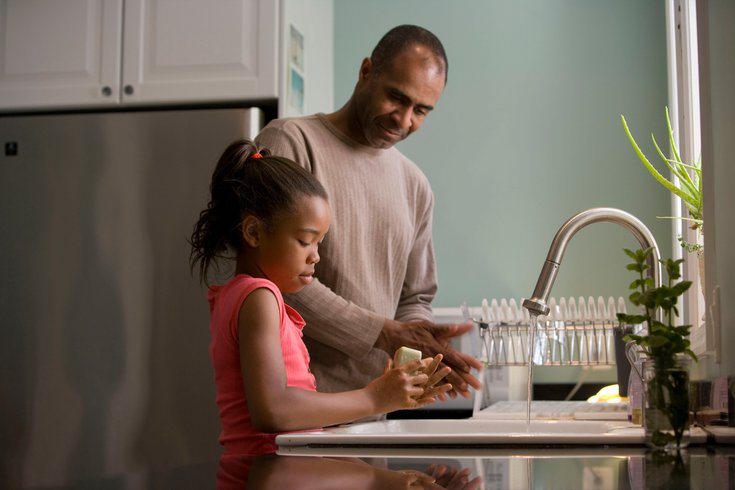
April 03, 2020
 CDC/Unsplash
CDC/Unsplash
To soothe children's anxieties during the coronavirus pandemic, pediatric experts recommend emphasizing preventive measures, like washing hands and social distancing.
The COVID-19 pandemic has resulted in widespread homeschooling in the Philadelphia region. There are no playdates or after-school activities any more.
This "new normal," even if temporary, can be especially hard on children. From anxiety over the coronavirus itself to restlessness from being cooped up inside, their emotions are probably running the gamut right now.
By adopting coping techniques, parents can help their children – and themselves – navigate this challenging time more smoothly.
Here's what local pediatric experts recommend:
"First, it is very important to follow proper routines and schedules as much as possible, such as bedtime, house rules, etc. in order to increase their sense of normalcy and security," says Brittany Spaeth, a child life specialist and manager of the Child Life Program at Children's Regional Hospital at Cooper in Camden, New Jersey.
Nancy Pontes, a family nurse practitioner and assistant professor of nursing at Rutgers University – Camden, recommends keeping separate schedules for weekdays and the weekend. And the daily schedule should include at least one hour of physical activity and 8-10 hours of sleep, depending on the age of the children.
Child life specialists at the Children's Hospital of Philadelphia recommend explaining the symptoms COVID-19 causes, noting they are similar to influenza, a more familiar illness.
"Consider your child's age, personality and development when sharing information," they wrote in a recent blog post. "To help clarify any misconception, begin by asking what your child already knows."
Children may have heard things that are either untrue or exaggerated, which can increase their fears. "Reassure your child that they can come to you to ask questions," they wrote.
They also suggest monitoring children's exposure to COVID-19 related news.
The information scientists know about the coronavirus and COVID-19, the disease it causes, is constantly changing. That makes it harder to know how to allay the fears and anxieties of children.
Focusing on preventive measures puts more control in children's hands, easing their worries, experts say. They suggest explaining how social distancing and good hand hygiene keep them safe.
They also recommend encouraging children to share their feelings and to practice self-reflection through journaling or medication.
Pontes suggests creating a time capsule together. Include any journals or blogs that family members have been keeping, or record videos together.
While a little bit more electronic use is expected during this time, parents also should actively play with their kids as much a possible. If children love to bake, now is a great time to experiment on new recipes together. Card and board games are also fun ways to stay connected as a family, experts say.
Fresh air is also important, so parents should make an effort to get children outside, experts say. Just make sure they are maintaining proper social distance at all times. CHOP has created a video with guidelines for social distancing for children. You can find it here.
"Play and physical activity help children expend extra energy, especially if they've been cooped up in the house," Spaeth says. "Arts and craft activities also provide good outlet for self-expression, especially for worries."
Pontes suggests conducting good, old-fashioned scavenger hunts and sing-a-longs.
"Have time for fun," she emphasizes. "Give your kids a sense of adventure in their own home."
Virtual hangouts have become popular as people try to stay connected with family and friends while stuck at home.
Parents can use video chat apps, like FaceTime and Messenger, to hold regular virtual get-togethers with family members. This way, children can still see their grandparents and cousins.
Encouraging children to stay in touch with their friends is helpful, too, experts say. Even a simple phone chat or text conversation can lift their spirits.
Connection is so important, Pontes says. Children need physical affection, so go ahead and give those extra hugs and cuddles.
It's important for parents to practice good self-care because children look to adults for guidance and support. Children can easily pick up on their parents' stress and internalize it.
"This is a stressful time for adults and children alike," Spaeth says. "Some children will express their anxiety by being more emotional and clingy than normal. Some may even regress a bit. This can be frustrating for parents and caregivers, but be as patient and understanding as possible."
Parents should contact their child's primary care provider if they become worried about their child's behaviors or emotions.